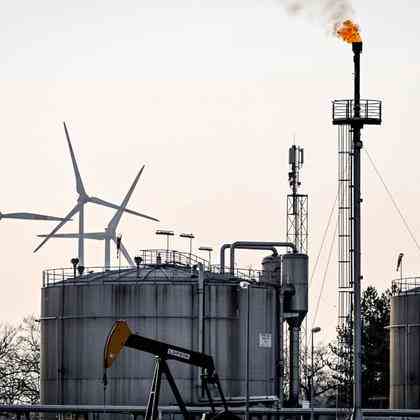Status: 04/28/2022 12:55 p.m
Despite the war in Ukraine, the oil and gas producer Wintershall Dea is sticking to its holdings in Russia. However, there will be no new projects, the group said today.
Wintershall Dea’s fresh quarterly figures have seldom attracted as much attention as they do today. But the oil and gas company’s loss of billions almost faded into the background in the one-and-a-half-hour online press conference. Because the main focus was on one question: How will business in Russia continue? And so company boss Mario Mehren also explained the basics at one point or another: Wintershall Dea is a producer, not a dealer. This is easily confused in public. “We do not import gas from Russia, so we are not affected by sanctions,” Mehren clarified. The Russian partner Gazprom takes care of that. In Siberia, Wintershall Dea and Gazprom are producing gas in a joint venture.
Holdings continue
Mehren understands that demands are constantly being made these days to stop all existing projects and activities in Russia immediately. “For coal, that has already been decided by the EU. For oil, it is currently being discussed,” he said. Coal and oil suppliers were easier to change globally, however, since transport was mainly by ship and tanker across the oceans. “Gas imports from Russia can also be substituted. But not quickly. The German government has repeatedly pointed this out,” said the company boss.
And so it was clear how Wintershall Dea would behave in the coming months: “After intensive discussions on the Executive Board, we decided to maintain our participation in our existing projects in Russia. If we pulled out, billions would go to the Russian state,” said the corporate boss.

Wintershall Dea
Wintershall Dea emerged in 2019 from the merger of Wintershall Holding GmbH and Dea AG. The company, based in Kassel and Hamburg, employs almost 2,500 people worldwide. BASF holds a good 70 percent in Wintershall Dea. The rest is owned by LetterOne, a holding company in which Russian oligarch Mikhail Fridman pooled his Dea shares.
No business as usual with Russia
Nevertheless, Mehren also made it clear that Russia had clearly crossed a red line with the war of aggression. This war represents a “fundamental turning point” for Wintershall Dea. The announcement is therefore: There will be no simple “business as usual” with Russia.
“However, there are fundamental realities that we cannot ignore. Germany and Europe need a secure and affordable energy supply. This need will remain,” said Mehren. Germany is a large industrial nation that is dependent on energy imports – and will continue to do so in the future. “Even in the age of renewable energies. We need a lot more energy than we can generate in Germany.”
More gas from Norway and Algeria
But where is this energy supposed to come from in the future? Fewer and fewer from Russia: Wintershall Dea is sticking to contractual obligations with Russian partners; However, payments to Russia have been stopped and there will be no new projects either. The same applies to cooperation with Russian partners outside of Russia.
The energy producer is therefore changing its strategy. The first projects were presented today. The company is focusing more on Norway, Algeria and Germany. Winterhall Dea is currently involved in three major new projects in Norway: Nova, Njord and Dvalin. “Our declared goal: We want to put the conveyor into operation by the end of this year,” explained Mehren.
Algeria, now Europe’s third largest exporter of gas, will also play a more important role for his company. Negotiations are currently underway there about further growth opportunities. And even in Germany, the company is examining where and how “domestic production” of gas can be kept stable. Mehren was not more specific. The head of the company left it open whether an expansion was also planned.
A look at the balance sheet figures underpins the change in strategy: In the first quarter, the group had to write down its Russian business in the amount of 1.5 billion euros. The bottom line was a net loss of one billion euros. The write-down of the financing of the controversial Nord Stream 2 gas pipeline and impairments on Russia-related assets of the company were responsible for the red figures in the first quarter.
Wintershall DEA stays in Russia
Alexander Schmitt, HR, April 28, 2022 1:25 p.m

